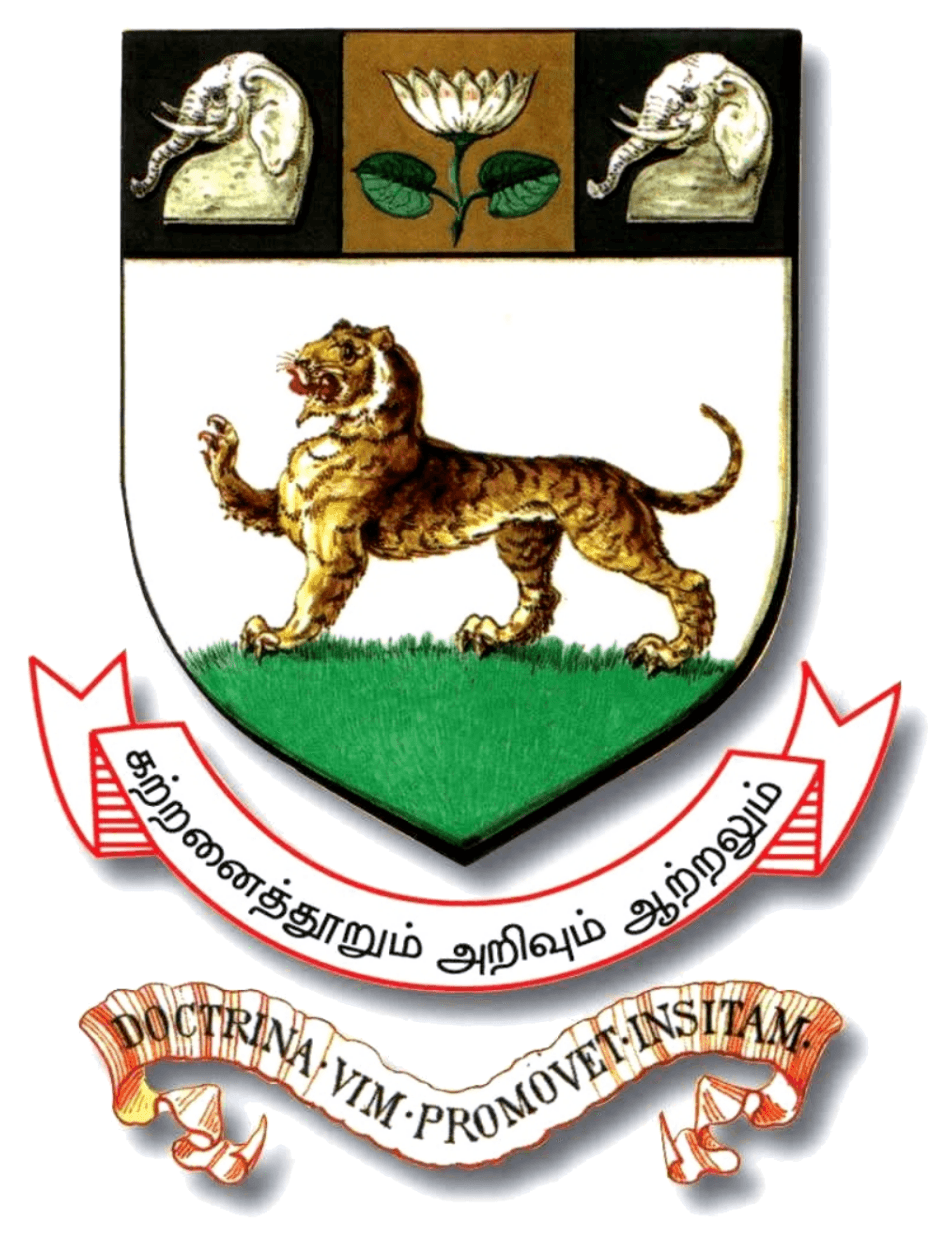
University of Madras

Governor of Tamil Nadu (Chancellor)
Summary
The University of Madras, commonly known as Madras University, is a popular public state institution situated in Chennai, Tamil Nadu, India. Established in 1857 by an act of the Legislative Council of India during British rule, it is one of India's oldest and most important educational institutions. Notably, its alumni include five Presidents of India, three Chief Justices of the Supreme Court, and renowned scientists such as CV Raman, Subrahmanyan Chandrasekhar, and Srinivasa Ramanujan.
The university has six campuses in the city: Chepauk, Marina, Guindy, Taramani, Maduravoyal, and Chetpet, and offers a broad spectrum of academic programmes. It offers nearly 230 courses across 87 academic departments organised into 18 schools, covering a wide range of topics including sciences, social sciences, humanities, management, and medicine. The university also has ties with 121 colleges and 53 accredited research institutions, including national centres for advanced research in nanotechnology, photonics, and neurotoxicity.
The University of Madras, known for its outstanding education, received major awards from accredited organisations such as the National Assessment and Accreditation Council (NAAC), including a 'five-star' accreditation and the highest A++ grade. Furthermore, the University Grants Commission has listed it as a 'university with potential for excellence (UPE)', recognising its achievements in fields such as drug development and climate change.
History
The roots of higher education in the Madras Presidency delve back to 1839 when a groundswell of demand for advanced learning reverberated throughout the region. In a watershed moment, 70,000 native inhabitants affixed their signatures to a petition addressed to The Right Honourable Lord John Elphinstone G.C.H., then Governor of Madras. This impassioned plea, championed by the Advocate General Mr George Norton, implored Lord Elphinstone to establish an English College in Madras, marking the inception of a transformative journey in education.
Lord Elphinstone, recognising the urgency of the petition, crafted a visionary plan for a Central Collegiate Institution. The formal constitution of the University Board in January 1840, with Mr. George Norton at its helm, signified the commencement of this ambitious endeavour. The Board envisaged twin Departments: one dedicated to English literature, regional languages, philosophy, and sciences, and the other focusing on higher branches of literature, philosophy, and science.
Yet, it wasn't until 1854 that a comprehensive educational policy for India began to crystallise. The issuance of the historic Dispatch of 1854, or Sir Charles Wood's Education Dispatch, marked a pivotal moment. It advocated for a coherent educational system from primary schools to universities, emphasising the establishment of professorships to disseminate learning across various disciplines.
Aligned with these principles, the University of Madras was formally incorporated on 5th September 1857, modelled after London University. Its establishment heralded a new era of enlightenment, propelling the region towards academic excellence.
Throughout the nineteenth century, the University expanded its scope, encouraging scholarly pursuits and intellectual exchange. Its influence spread well beyond Madras, spawning several educational institutions throughout South India. Notable among these were Mysore University (1916), Osmania University (1918), and Andhra University (1926), all of which demonstrate the University of Madras' ongoing legacy.
Central to the University's identity was its Coat of Arms, conceived in 1857. Adorned with a majestic tiger, elephants, and a lotus flower, the Coat of Arms symbolises strength, wisdom, and resilience. Its motto, "Doctrina Vim Promovet Insitam," encapsulated the ethos of the university: “Learning promotes one's natural talent.”
In 1912, the University received endowments to establish departments in Indian History, Archaeology, Comparative Philology, and Indian Economics, enriching its academic tapestry. By the close of the year, it boasted 17 departments, 30 esteemed faculty members, and a burgeoning cohort of research scholars.
The dawn of Indian independence in 1947 brought about significant changes. Amendments to the University of Madras Act of 1923, coupled with the establishment of the University Grants Commission in 1956, propelled the University towards greater autonomy and dynamism.
In 2024, the University of Madras ranked 526 globally in QS World rankings and 251-269 in QS Asia rankings. Nationally, it holds the 50th position in NIRF for Universities and 20th in Outlook India's 2020 rankings. Notably, in Business/Management, it ranks 20th among Government colleges as per Outlook India's 2022 rankings, showcasing its enduring commitment to academic excellence.
Courses
The University of Madras offers a broad spectrum of courses to meet the diverse academic and professional aspirations of students at different levels. At the undergraduate level, the university provides programmes across various disciplines including arts, science, commerce, management, computer applications, and education. These courses lay a strong foundation, equipping students with essential knowledge and skills required for their chosen career paths.
Moving to postgraduate studies, the University of Madras offers specialised programmes such as M.A. in Lifelong Learning and M.A. in Human Resource Management, available in both regular and self-supportive modes. These courses are designed to provide in-depth knowledge and advanced skills, preparing students for leadership roles and specialised careers in their respective fields.
For those aiming to engage in scholarly research, the University of Madras offers M.Phil. programmes in Continuing Education Management and Human Resource Management, both available on a full-time basis. These programmes focus on advanced research and scholarly inquiry, providing students with the opportunity to delve deeply into their chosen subjects under the guidance of experienced faculty members.
The university also supports doctoral candidates through its Ph.D. programme in Adult and Continuing Education, available both full-time and part-time, and encompassing interdisciplinary research. This programme is ideal for students aiming to contribute original research and expand the boundaries of knowledge in their fields.
In addition to these traditional academic programmes, the University of Madras offers a variety of certificate courses designed to provide specialised skills and enhance employability. These include certificates in NGO Management, Blogging, TV News Reading and Comparing, Web-Page Design, Pre-Primary Education, Hospitality Management, Skin Care and Beauty Therapy, and Women’s Studies. These certificate courses, all offered in a self-supportive mode, address the growing demand for specific skill sets in various industries.
Through its diverse course offerings, the University of Madras ensures that students have access to a rich academic environment that fosters learning, research, and professional development. The university’s commitment to providing high-quality education is reflected in its dynamic curriculum, which is continually updated to meet the evolving needs of society and industry. Whether students are seeking to advance their academic knowledge, engage in cutting-edge research, or acquire new professional skills, the University of Madras provides the resources and support necessary to achieve their goals.
Global MBA rankings
- University of Madras ranks 526th in QS World University Rankings (2024).
- In QS Asia Rankings (2023), it secures a position between 251 to 269.
Job integration rate
According to the Siksha, during the University of Madras placements in 2023, 468 PG (2-year) students and 21 PG (3-year) students secured positions. The median salary package offered was INR 3.73 LPA for PG (2-year) students and INR 3.89 LPA for PG (3-year) students.
General information
- University of Madras| Wikipedia
- Madras University: Courses, Admission 2024, Fees| Shiksha
- Madras University: Admissions 2024, Courses, Fees| Collegedunia
- Madras University| Institute of Distance Education
- University of Madras| About University
- University of Madras| Facebook
- University of Madras| Linkdin
- Madras University: Admission, Courses, Fees, Placements| Careers360
- University of Madras : Rankings, Fees & Courses Details| Top Universities
Explore the latest data on Business, Industry Leaders and Influencers, Organizations, Education, and Investors to stay informed and ahead.

Governor of Tamil Nadu (Chancellor)
